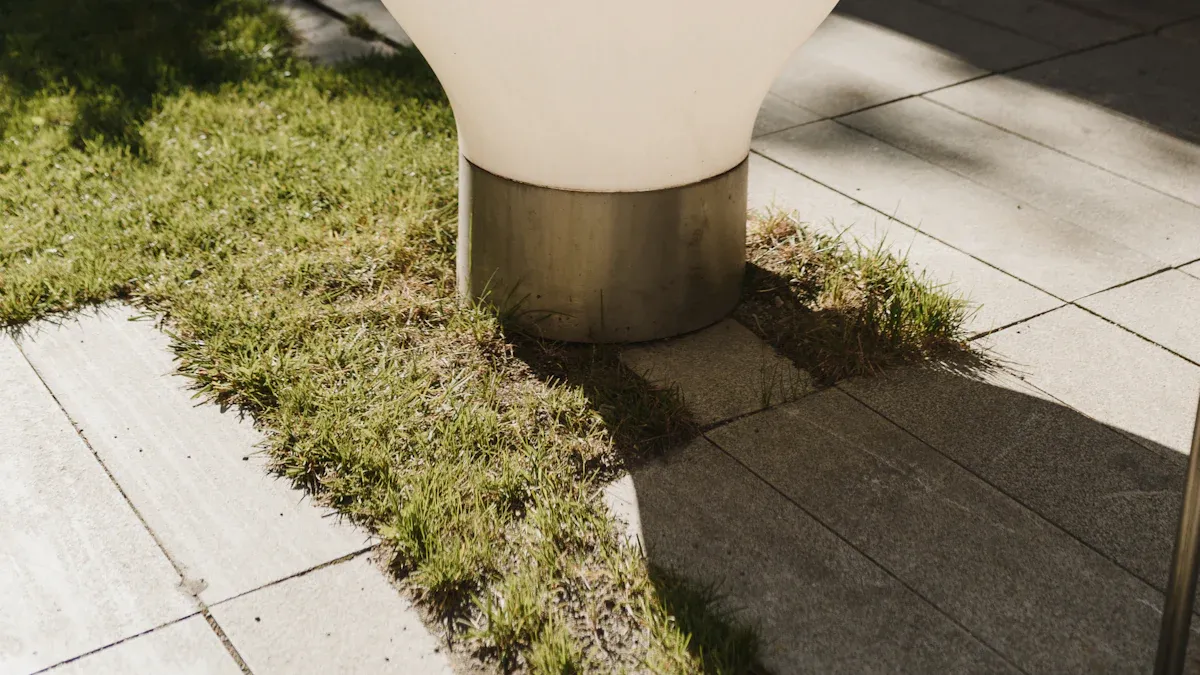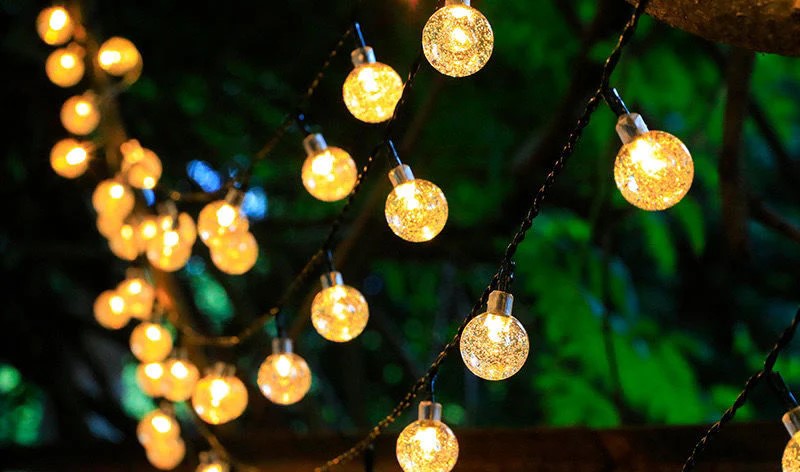Outdoor Floor Lamps in 2025: Solar vs Battery Options

Selecting the ideal outdoor floor lamp in 2025 can be a challenge. A significant number of individuals now favour solar-powered outdoor floor lamps, with over 60% opting for them. This highlights an increasing appreciation for eco-friendly outdoor lighting solutions. Advancements in solar technology now enable over 20% of sunlight to be converted into energy. However, battery-powered outdoor floor lamps remain a reliable choice for areas with shade or frequent cloud cover. Choosing the most suitable lamp depends on your location, energy requirements, and environmental objectives. The right outdoor floor lamp not only enhances your space but also conserves energy.
Key Takeaways
Solar outdoor lamps are good for the environment and sunny places. They turn over 20% of sunlight into power.
Battery lamps are easy to use and work in shady or cloudy spots. They give steady light without needing the sun.
Think about your area when picking a lamp. Solar lamps are best for sunny spaces, while battery lamps work better in less sunny areas.
Solar lamps need little care and can lower electricity costs. Battery lamps might need new batteries often.
Both lamps have special advantages. Pick one based on your energy plans and outdoor needs.
Understanding Outdoor Floor Lamps
How Solar-Powered Lights Work
Solar lights use sunlight to make electricity. They work with solar panels that turn sunlight into energy. By 2025, these panels can convert over 20% of sunlight. Monocrystalline cells, which are very efficient, are the most popular. The energy is stored in lithium-ion batteries, which last over five years. These batteries charge faster than older lead-acid ones.
New solar lights come with smart features. Sensors adjust brightness and detect motion to save energy. The SSL Version 5.1 rules ensure good colour and less glare. LUNA rules help save energy and protect the environment.
Solar lights are best for sunny places. They don’t need power from the grid, making them eco-friendly for outdoor spaces.
How Battery-Operated Lights Work
Battery-powered lamps store energy in rechargeable batteries. They use LED bulbs, which are bright, efficient, and last long. Better batteries now last longer and need fewer replacements, saving money.
But, battery lights have some problems. Their brightness can fade, and extreme weather can affect them. Still, they work well in shady spots or places with little sunlight. Unlike solar lights, they don’t need sunlight, so they’re flexible for different areas.
In 2025, battery lamps follow the same SSL and LUNA rules as solar lights. These rules ensure good lighting and eco-friendly practices. With care, battery lamps can light up your outdoor space reliably.
Pros and Cons of Solar Outdoor Floor Lamps

Benefits of Solar-Powered Lights
Solar lights have many benefits for outdoor areas. They are simple to set up since no wiring is needed. You can place them anywhere with sunlight, making them flexible. These lights use sunlight for power, cutting energy use and bills. Modern LEDs make them brighter while using less energy.
Solar lights are good for the environment. They use renewable energy, lowering your carbon footprint. Many now have smart features like motion sensors and brightness controls. These save energy and make batteries last longer. For paths or patios, solar lights are both useful and stylish.
Pros |
Cons |
|---|---|
Need several units |
|
Brightens paths |
Batteries wear out |
Can be stolen |
Drawbacks of Solar-Powered Lights
Solar lights also have some downsides. They need sunlight to charge, so they don’t work well in shade or cloudy weather. If your area has little sunlight, they might not be ideal. You may need more lights to brighten large spaces.
The batteries in solar lights can wear out over time. Replacing them adds to upkeep costs. Some models are light and portable, making them easy to steal if not secured. Though durable, harsh weather can reduce their performance and lifespan.
Pros and Cons of Battery-Operated Outdoor Floor Lamps
Benefits of Battery-Operated Lights
Battery lights have many good points for outdoor use. They are simple to set up since no wires are needed. You can move them easily to light up patios or gardens. These lights are also great for camping or other outdoor trips. They make dark areas safer and easier to see.
Modern battery lights use LED bulbs, which save energy. These bulbs give bright light but use less power. This helps lower energy use and saves money over time. Many now come with rechargeable batteries that last longer. This means fewer replacements, saving money and cutting waste.
Battery lights are very flexible. They work well in shady spots or places with little sunlight. Solar lights may not work there, but battery lights do. Whether for a garden party or a hiking trip, they are a dependable choice.
Drawbacks of Battery-Operated Lights
Battery lights also have some downsides. Batteries can weaken over time, making lights dimmer. You might need to recharge or replace them more often. Very hot or cold weather can also harm the batteries.
You need to check and maintain the batteries regularly. This can be annoying if you use the lights daily. Rechargeable batteries are better for the planet but must be disposed of properly.
Battery lights can cost more at first than regular lights. But they save money later by using less energy and needing less upkeep. If you want easy-to-use and portable lights, they are still a smart option despite these issues.
Solar vs Battery-Operated Outdoor Floor Lamps: A Comparative Analysis

Cost and Maintenance
Solar lights cost more at first but save money later. They don’t need electricity, so bills are lower. Battery lights are cheaper to buy but need new batteries often. If used a lot, battery costs can quickly add up.
Solar lights need little care. Clean the panels sometimes for best results. Battery lights need more work. You must check and change batteries often, especially with daily use. For less hassle, solar lights are easier to maintain.
Feature |
Solar-Powered Lights |
Battery-Operated Lights |
|---|---|---|
Cost |
Higher upfront, no electricity cost |
Cheaper upfront, ongoing battery cost |
Maintenance |
Low maintenance, no battery changes |
Regular battery replacement needed |
Sustainability and Environmental Impact
Solar lights are better for the planet. They use sunlight, which is renewable energy. This helps reduce pollution and keeps the Earth greener. Battery lights are less eco-friendly. Throwing away old batteries can harm nature if not done right. Rechargeable batteries are better but still not as green as solar lights.
If you care about the environment, solar lights are the best pick. They use clean energy and are perfect for eco-friendly users. Battery lights are more flexible but have a bigger environmental impact.
Performance and Reliability
How well these lights work depends on their type. Solar lights need sunlight to charge. They shine brightly in sunny places but are weaker in shade or clouds. Battery lights are steady and bright no matter the weather. They can also be used indoors, making them more useful.
Both types are reliable but in different ways. Solar lights are tough and handle outdoor weather well. But they may not work well in long bad weather. Battery lights are less affected by weather but need battery changes to stay bright. For all-year use, battery lights might be a smarter choice.
Tip: Solar lights are great for sunny spots. For shady areas or inside use, battery lights work better.
Suitability for Different Environments
Picking between solar and battery outdoor floor lamps depends on your location. Each type has features that suit certain places better.
Sunny Locations
Solar lights are great for areas with lots of sunlight. If your garden or patio gets sun most of the day, they work well. They charge during daylight and shine brightly at night. These lights are perfect for open spots like terraces or near pools.
Tip: Put solar lights where nothing blocks sunlight, like trees or walls, to charge fully.
Shady or Cloudy Areas
Battery lights are best for places with little sunlight. If trees or buildings block the sun, solar lights may not charge enough. Battery lights stay bright even without sunlight. They are also good for areas with cloudy weather.
Extreme Weather Conditions
Both types handle outdoor weather, but they perform differently. Solar lights work well in sunny climates but may struggle in long rainy or snowy periods. Battery lights don’t rely on weather, so they are more useful in extreme conditions.
Temporary or Portable Needs
For short-term use like camping or events, battery lights are better. They are easy to carry and don’t need sunlight, so you can use them anywhere. Solar lights are eco-friendly but less handy for quick or mobile use.
Knowing your environment helps you decide. Solar lights are ideal for sunny, open areas, while battery lights are better for shaded or changing conditions.
Picking between solar and battery outdoor lamps depends on your needs. Solar lamps are great for eco-friendly people who like green energy. Battery lamps are better for shady spots or cloudy days. If you want steady light all year, battery lamps are reliable. For saving money, solar lamps cut electricity costs over time. Think about your location and how you’ll use the lamp. The best outdoor lamp will brighten your space and match your energy goals.
FAQ
How long do outdoor floor lamps last?
The lifespan depends on the type of lamp. Solar lamps can last 5–10 years, but their batteries need changing every 2–5 years. Battery-powered lamps last a few years if you take good care of them.
Can outdoor floor lamps handle bad weather?
Most outdoor lamps are made to resist weather. Solar lamps work well in rain and sun but may not do well in long snow periods. Battery lamps are better in tough weather but need regular care to last longer.
How should I care for my outdoor floor lamp?
For solar lamps, clean the panels often to keep them working well. For battery lamps, check and replace the batteries when needed. Keep portable lamps inside during bad weather to make them last longer.
Are outdoor floor lamps good for saving energy?
Yes, both types save energy. Solar lamps use sunlight, cutting electricity costs. Battery lamps use LED bulbs, which need less power and last longer, saving money over time.
Which lamp is best for eco-friendly users?
Solar lamps are best for eco-friendly people. They use sunlight, which is renewable, and lower your carbon footprint. Battery lamps are less green because of battery waste, even with rechargeable ones.

